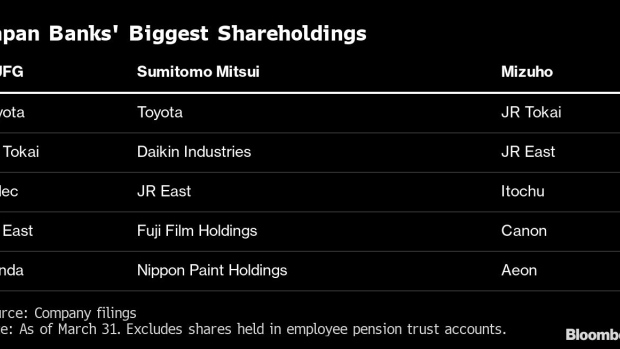Dec 10, 2020
Japan’s Megabanks Have a $44 Billion Problem With Client Stakes
, Bloomberg News

(Bloomberg) -- Japan’s biggest banks have a $44 billion problem: how to sell stakes in their most important clients without losing their business.
The lenders have offloaded trillions of yen in cross-shareholdings in the past decade under pressure from regulators and investors. Now they are down to a clutch of firms that are resistant to stake sales, according to interviews with more than half a dozen bank officials, who asked not to be identified because of the sensitivity of the discussions.
Firms have threatened to take their business elsewhere if lenders sell their holdings, said one senior executive at a major bank. Such resistance is leaving banks in a bind as they seek to improve corporate governance and shore up their finances through the divestments. The practice of cross-holdings is largely unique to Japan, where it emerged after the war to cement ties with friendly owners and keep more demanding shareholders at bay.
“There is a bedrock,” said Rie Nishihara, a senior bank analyst at JPMorgan Chase & Co. “I expect megabanks to keep cutting cross-shareholdings but the pace will slow.”
A slowdown in sales would impair lenders’ efforts to reduce vulnerability to financial markets and bolster capital to give back to shareholders or spend on their businesses. Banks have also been booking gains on the offloads, so any drop in such transactions would weaken earnings that are already being battered by rock-bottom interest rates and rising credit costs during the pandemic.
Japan’s three biggest lenders -- Mitsubishi UFJ Financial Group Inc., Sumitomo Mitsui Financial Group Inc. and Mizuho Financial Group Inc. --- have signaled a commitment to keep reducing their cross-holdings, which totaled 4.6 trillion yen ($44 billion) as of March. They have unloaded 3.6 trillion yen since 2010, a task made easier by targeting companies that were more receptive to the trend than bedrock clients.
MUFG’s current goal involves cutting 800 billion yen of stocks in the six years ending March 2021. Sumitomo Mitsui aims to shed 300 billion yen in the five years through March 2025, while Mizuho plans to trim 300 billion yen in the three years ending March 2022.
“Selling strategically held stocks is one of our priorities in our next medium-term business plan,” MUFG Chief Executive Officer Hironori Kamezawa said in an investor presentation last month. Japan’s largest bank will consider targeting reductions of at least 100 billion yen annually, he said.
The unwinding has coincided with a corporate governance code introduced under former Prime Minister Shinzo Abe, which has seen a long-awaited rise in investor activism in the world’s third-largest stock market. Revisions made in 2018 added language explicitly urging companies not to take business elsewhere if banks cut stakes, although the guidelines are voluntary.
Read how investors expect Abe’s governance reforms to stay
“From a governance perspective, it is important that banks continue their policy of a steady sell-down of their shareholdings,” said Zuhair Khan, managing director at UBP Investments, where he manages a fund that bets on Japanese companies based on their oversight.
Underscoring the risks of keeping large holdings on the books, Mizuho reported 55.2 billion yen in impairment losses on its stock portfolio in the six months ended September. “Risks of strategic shareholdings materialized,” CEO Tatsufumi Sakai told investors last month.
“It’s true that banks are in a difficult position,” JPMorgan’s Nishihara said. “They can’t just sell at their own pace when corporate clients don’t want them to.”
©2020 Bloomberg L.P.